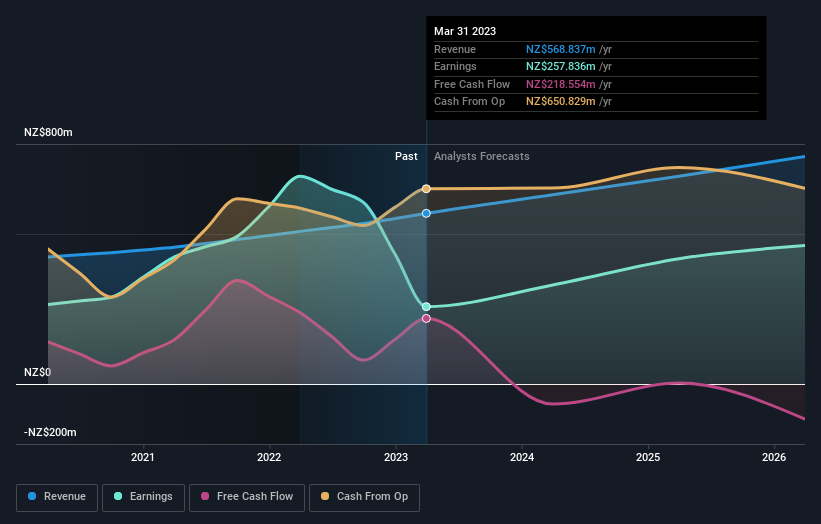- New Zealand
- /
- Healthcare Services
- /
- NZSE:RYM
Painful week for individual investors invested in Ryman Healthcare Limited (NZSE:RYM) after 6.6% drop, institutions also suffered losses

Key Insights
- Significant control over Ryman Healthcare by individual investors implies that the general public has more power to influence management and governance-related decisions
- The top 25 shareholders own 40% of the company
- Recent sales by insiders
A look at the shareholders of Ryman Healthcare Limited (NZSE:RYM) can tell us which group is most powerful. We can see that individual investors own the lion's share in the company with 58% ownership. Put another way, the group faces the maximum upside potential (or downside risk).
While institutions who own 37% came under pressure after market cap dropped to NZ$4.3b last week,individual investors took the most losses.
Let's take a closer look to see what the different types of shareholders can tell us about Ryman Healthcare.
See our latest analysis for Ryman Healthcare

What Does The Institutional Ownership Tell Us About Ryman Healthcare?
Many institutions measure their performance against an index that approximates the local market. So they usually pay more attention to companies that are included in major indices.
As you can see, institutional investors have a fair amount of stake in Ryman Healthcare. This suggests some credibility amongst professional investors. But we can't rely on that fact alone since institutions make bad investments sometimes, just like everyone does. It is not uncommon to see a big share price drop if two large institutional investors try to sell out of a stock at the same time. So it is worth checking the past earnings trajectory of Ryman Healthcare, (below). Of course, keep in mind that there are other factors to consider, too.

Hedge funds don't have many shares in Ryman Healthcare. Karori Capital Limited is currently the company's largest shareholder with 7.7% of shares outstanding. For context, the second largest shareholder holds about 6.3% of the shares outstanding, followed by an ownership of 5.6% by the third-largest shareholder.
Our studies suggest that the top 25 shareholders collectively control less than half of the company's shares, meaning that the company's shares are widely disseminated and there is no dominant shareholder.
While it makes sense to study institutional ownership data for a company, it also makes sense to study analyst sentiments to know which way the wind is blowing. Quite a few analysts cover the stock, so you could look into forecast growth quite easily.
Insider Ownership Of Ryman Healthcare
The definition of an insider can differ slightly between different countries, but members of the board of directors always count. Company management run the business, but the CEO will answer to the board, even if he or she is a member of it.
I generally consider insider ownership to be a good thing. However, on some occasions it makes it more difficult for other shareholders to hold the board accountable for decisions.
Our most recent data indicates that insiders own some shares in Ryman Healthcare Limited. This is a big company, so it is good to see this level of alignment. Insiders own NZ$210m worth of shares (at current prices). Most would say this shows alignment of interests between shareholders and the board. Still, it might be worth checking if those insiders have been selling.
General Public Ownership
The general public, mostly comprising of individual investors, collectively holds 58% of Ryman Healthcare shares. This size of ownership gives investors from the general public some collective power. They can and probably do influence decisions on executive compensation, dividend policies and proposed business acquisitions.
Next Steps:
It's always worth thinking about the different groups who own shares in a company. But to understand Ryman Healthcare better, we need to consider many other factors. Case in point: We've spotted 4 warning signs for Ryman Healthcare you should be aware of.
If you would prefer discover what analysts are predicting in terms of future growth, do not miss this free report on analyst forecasts.
NB: Figures in this article are calculated using data from the last twelve months, which refer to the 12-month period ending on the last date of the month the financial statement is dated. This may not be consistent with full year annual report figures.
New: AI Stock Screener & Alerts
Our new AI Stock Screener scans the market every day to uncover opportunities.
• Dividend Powerhouses (3%+ Yield)
• Undervalued Small Caps with Insider Buying
• High growth Tech and AI Companies
Or build your own from over 50 metrics.
Have feedback on this article? Concerned about the content? Get in touch with us directly. Alternatively, email editorial-team (at) simplywallst.com.
This article by Simply Wall St is general in nature. We provide commentary based on historical data and analyst forecasts only using an unbiased methodology and our articles are not intended to be financial advice. It does not constitute a recommendation to buy or sell any stock, and does not take account of your objectives, or your financial situation. We aim to bring you long-term focused analysis driven by fundamental data. Note that our analysis may not factor in the latest price-sensitive company announcements or qualitative material. Simply Wall St has no position in any stocks mentioned.
About NZSE:RYM
Ryman Healthcare
Develops, owns, and operates integrated retirement villages, rest homes, and hospitals for the elderly people in New Zealand and Australia.
Reasonable growth potential low.
Similar Companies
Market Insights
Community Narratives




